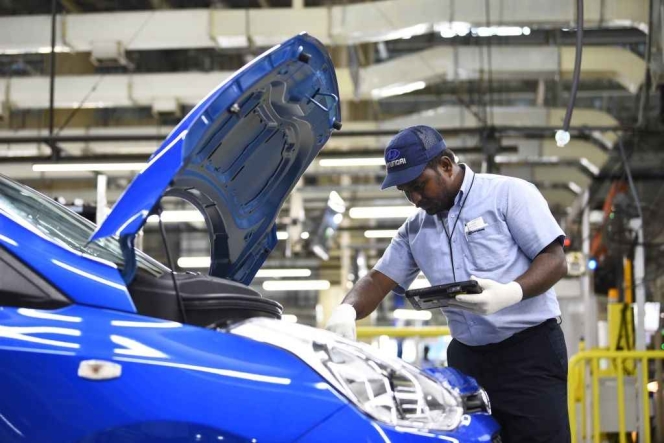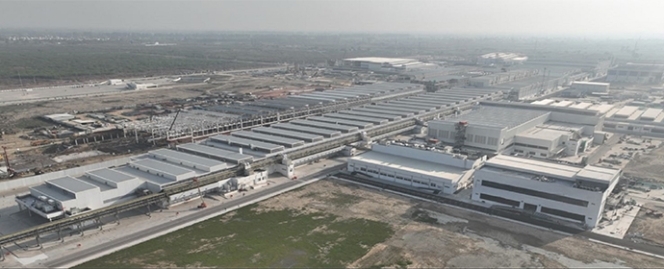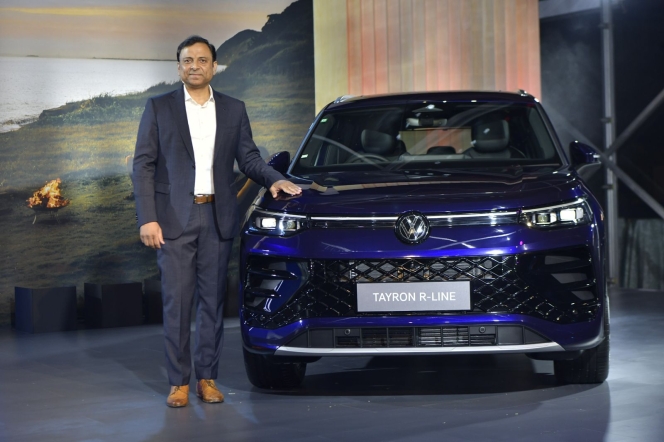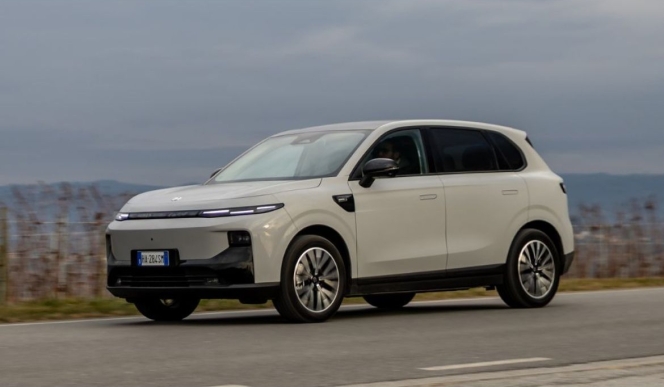

Speaking to this correspondent, Ganesh Mani S, Director – Production, HMIL, said, to have the first-mover advantage in the industry, carmakers are constantly looking for newer technologies and innovations. The Indian auto industry is at the cusp of a new era with updated regulation norms for emission and recall. This brings more relevance to have fool-proof quality testing processes in place. “Towards fulfilling this objective, we at Hyundai Motor India have a Quality Assurance ‘Testing, Inspection, and Certification’ (TIC) process to ensure that every car we make is 100 percent defect-free. The ‘TIC’ process has a two-pronged strategy. First, we test the condition of the respective part before assembling at the vendor’s end and next we test the condition of the assembled vehicle as per the required standards at our end.”
 It may be recalled that both its R&D Centres in Namyang, South Korea and in Hyderabad, India work in tandem to design and develop any new model. They also conduct all the region specific tests before they sign-off the car for manufacturing. “At the production stage, we conduct several standard tests including the wheel alignment, head-light aimer, roll and brake and much more. We test the ride handling capabilities of our cars first at our internal tracks in our Sriperumbudur facility which simulates 17 types of Indian road conditions, and later also conduct a Vehicle Durability Test across India. At the Certification level, we also use government authorised test agency (Global Automotive Research Centre) tracks to conduct standardized tests,” he said.
It may be recalled that both its R&D Centres in Namyang, South Korea and in Hyderabad, India work in tandem to design and develop any new model. They also conduct all the region specific tests before they sign-off the car for manufacturing. “At the production stage, we conduct several standard tests including the wheel alignment, head-light aimer, roll and brake and much more. We test the ride handling capabilities of our cars first at our internal tracks in our Sriperumbudur facility which simulates 17 types of Indian road conditions, and later also conduct a Vehicle Durability Test across India. At the Certification level, we also use government authorised test agency (Global Automotive Research Centre) tracks to conduct standardized tests,” he said.
Talking on the challenges faced in testing vehicles in the assembly line, he said, the digital revolution has created a great impact offering practically unlimited possibilities for a pleasant and safe driving experience. Today the cars are smarter and more connected than ever. This means an exponential increase in the number of tests and its duration at the assembling stage. “To offer best quality cars for our customers, we need to reach the desired quality targets and address defects related issues during assembling while successfully implementing the essential TIC solutions. This will help minimise the human error, if any. Solutions such as limiting the opportunity to insert the product on the wrong fixture (through appropriate mechanical constraints) and partially automating the activation of the correct test program (based on barcode readers) using in-line systems goes a long way. Along with maximum performance, the testing equipment should also be engineered to optimize system ergonomics with respect to operator comfort. This coupled with the precepts of lean production which will allow more flexibility in the mixing of various models. It is also necessary to guarantee high test results throughout to comply with the increasing production cycle-times. So, these testing machines should have the basic data analytics tool with summarized output screen, which could be used as an input for improving the process and design. This idea can also be extended to monitor the performance of the testing machine as well to proactively do the maintenance activities. Going forward, we will work towards minimising human intervention as much as possible and improve the process to do more self-learning and proactively suggest feedback & countermeasures,” he said.
Be it for the domestic or export markets, any OEM has to address three aspects to make cars with top-most quality. Firstly, at the design stage it is necessary to achieve the best performance and quality for the vehicle at optimal cost while keeping other factors in check. Hyundai ensures that all the learnings from previous models are implied in upcoming models. Secondly, during production it ensures that the vehicle meets all the required country-specific test standards and feature options for all its variants. Finally it understands the customer’s pulse and needs.
 “At HMI we transform metal into excellence with hand-crafted engineering and at 100 percent precision. To make the perfect cars we follow a 3-stage systematic tightening confirmation process which captures over 200,000 quality data points related to tightening, every day. We have linked this information with ‘Sign-off Gate’ to prevent the ‘not ok’ car roll out from the final assembly line. Our vehicle final inspection method is digitally enabled for assembled part specification/ type verification; we use a Hyundai Integrated Dialogistic System which is loaded with pre-set information on quality confirmations for 350+ variants. Such high degree of customization helps us to meet the growing customer requirement and enables desired results in the manufacturing process,” he said.
“At HMI we transform metal into excellence with hand-crafted engineering and at 100 percent precision. To make the perfect cars we follow a 3-stage systematic tightening confirmation process which captures over 200,000 quality data points related to tightening, every day. We have linked this information with ‘Sign-off Gate’ to prevent the ‘not ok’ car roll out from the final assembly line. Our vehicle final inspection method is digitally enabled for assembled part specification/ type verification; we use a Hyundai Integrated Dialogistic System which is loaded with pre-set information on quality confirmations for 350+ variants. Such high degree of customization helps us to meet the growing customer requirement and enables desired results in the manufacturing process,” he said.
Beyond BS-VI
The move to make BS-VI compliant vehicles is not just important for cleaner air but it will also enable carmakers and Government agencies to record data on Real Driving Emissions (RDE). After the roll-out of BS-VI complaint vehicles there will be enough captured data available with the concerned authorities and regulators to be able to reduce the gap between type-approval vehicle emissions results and the actual ones on roads. Hyundai has global experience in the area of RDE vehicle development and this is a huge technical advantage to help develop vehicles for the Indian market. “We have done some amount of testing specific to the Indian road conditions. Before the Government’s regulations are set in motion, we too will be prepared to take up this challenge by upgrading our technical and analytical capabilities in all the required areas,” he said.
Nowadays, all cars come loaded with different kinds of infotainment, safety and communication systems. For instance, the recently launched Creta has 50 plus India-specific connected features which is 30 percent more than any other cars manufactured by the company. All these are absolutely important to ensure all these electronic devices work smoothly for the customer to enjoy a great drive. HMI has a multi-layered assurance process designed and developed by its in-house teams with specific performance indicators. ‘Hyundai Automatic Diagnostic System’ is another tool it uses to inspect the proper functioning of over 60 checkpoints in the electrical system and connected car features in all its cars.
Besides, it also has an integrated in-line testing facility installed in the assembly process line to check and approve the performance of all electronic systems fitted in all the cars at the sign-off gate. Also it ensures that the same level of standards are maintained at the vendors end too. This makes the quality assurance process more robust & mistake proof, Ganesh Mani added. (MT)
Maruti Suzuki India Reports INR 37.94 Net Profit For Q3 FY2026
- By MT Bureau
- January 28, 2026

Maruti Suzuki India, the country’s largest passenger vehicle manufacturer, has reported its financial results for Q3 FY2026.
The company reported revenue of INR 475.344 billion, as against INR 368.02 billion last year, net profit came at INR 37.94 billion, as against INR 36.59 billion last year. It is to be noted that the net profit was impacted for Q3 FY2026 was impacted due to a one-time provision of INR 5,939 million relating to new Labour Codes.
During the period, the company achieved its highest quarterly domestic sales of 564,669 units, an increase of 97,676 units over the previous year. Total sales reached 667,769 units, which included 103,100 units in exports. This performance was supported by a recovery in the car market following GST reform, with the small car segment in the 18 percent GST bracket contributing significantly to the volume increase.
For the nine-month period from April to December 2025, the company recorded its highest sales volume, net sales and net profit. Total sales volume reached 1,746,504 units, with domestic sales at 1,435,945 units and exports at 310,559 units. Net sales for this period increased to INR 1,242 billion, while net profit grew to INR 1,085 billion.
Financial statements for the period have been restated following the amalgamation of Suzuki Motor Gujarat (SMG) with MSIL. This process took effect from 1 April 2025. The company continues to monitor market conditions as it manages its manufacturing and sales operations.
The recovery in the car market was led by the small car segment. Sales growth in this category accounted for 68,328 units of the total domestic increase. The company remains focused on domestic and export markets to maintain its sales volumes.
Volkswagen India Unveils Tayron R-Line, Plans 4 More Launches In 2026
- By MT Bureau
- January 28, 2026

Volkswagen Passenger Cars India has showcased the Tayron R-Line, marking the first of five product interventions scheduled for 2026.
The company plans to introduce updates or new models in every quarter to maintain market presence. These interventions will include SUV, Sedan and Hatchback body styles, with each model intended for different segments of the premium market.
For 2026, the company stated it has established objectives focused on products, customer engagement and experiences. The strategy involves using product actions to address various customer sets throughout the year. The brand aims to sustain interest through these quarterly releases across its vehicle portfolio.
The roadmap for the year is designed to cover multiple segments, ensuring a consistent rollout of updates. By addressing three body styles, the manufacturer intends to reach a broad audience within the premium category. The initiative forms part of a wider plan to enhance the ownership experience and interaction with the brand in India.
Nitin Kohli, Brand Director, Volkswagen Passenger Cars India, said, “Today, we are glad to showcase the Tayron R-Line for the first time in India. I am also delighted to announce that we have planned four more product interventions throughout the year. This year, every quarter will witness a new product intervention that will cater to a different premium customer set. Our objective is to continue building excitement for customers through smart product actions and introducing models that will continue to build aspirations.”
- Renault India
- Renault Group Modular Platform
- RGMP
- Renault Duster
- Fabrice Cambolive
- Stephane Deblaise
- Renault Group
Renault Unveils New Generation Duster In India, Hybrid Variant Launch In Diwali 2026
- By MT Bureau
- January 27, 2026
Renault India has revealed the new generation Duster in Chennai, marking the return of the nameplate to the Indian market. The vehicle is the first product launched under the Renault International Game Plan 2027, a strategy positioning India as a hub for the company's operations outside Europe.
The SUV is built on the Renault Group Modular Platform (RGMP), with 90 percent of its components designed specifically for the Indian market. The vehicle features a 2,657 mm wheelbase and 212 mm of ground clearance, with approach and departure angles of 26.9deg and 34.7deg respectively.
The Duster introduces three engine options, including a hybrid variant for the first time in India. The Strong Hybrid E-Tech 160 pairs a 1.8L engine with a 1.4 kWh battery, designed to operate in electric mode for a claimed up to 80 percent of city driving.
Two petrol options are also available: the Turbo TCe 160, producing 163 PS and 280 Nm of torque and the Turbo TCe 100. Transmission choices include a six-speed manual and a six-speed dual-clutch transmission (DCT) with a wet clutch.
The cabin features a driver-centric layout with a 10.1-inch OpenR Link multimedia system. This system incorporates Google built-in, providing native access to Google Maps, Assistant, and the Play Store. A second 10.25-inch TFT display serves as the instrument cluster, capable of replicating navigation data.
Additional interior features include:
- Ventilated and electric front seats.
- Dual-zone automatic air conditioning with a PM2.5 air quality filter.
- Panoramic sunroof and electric tailgate.
- 17 Advanced Driver Assistance Systems (ADAS) functions.
Fabrice Cambolive, CEO, Renault Brand, said, “As part of the Renault International Game Plan 2027, we are making India a key pillar of our growth outside Europe. We now have a strong ecosystem in Chennai, bringing together design, engineering, manufacturing, and local operations at the highest level - making India one of the most complete and powerful hubs in Renault’s global network. The new Renault Duster is the first step in Renault’s renewal in India.”
Stephane Deblaise, CEO, Renault Group India, added, “With the new Renault Group Modular Platform, Renault brings an advanced hybrid technology and top-tier safety engineering. With Renault Forever program, we also offer our customers a significantly improved ownership experience. New Renault Duster is the start of a renewed product cycle and for an exciting trajectory for Renault in India. Renault is back.”
The vehicle comes with an industry first 7-year or 150,000 km warranty under the Renault Forever programme. Pre-bookings are open via the 'R Pass', with official pricing expected in mid-March 2026. Deliveries for petrol variants will commence in April 2026, while the Strong Hybrid version is scheduled for release during Diwali 2026.
Leapmotor Showcases Electric And Hybrid Models At Brussels Motor Show
- By MT Bureau
- January 25, 2026

Stellantis-owned electric vehicle brand Leapmotor recently showcased its new range of product offerings at the Brussels Motor Show.
The OEM utilised the platform to display its latest vehicle technologies and models as part of an expansion strategy within the European market. The lineup featured both battery electric vehicles (BEVs) and hybrid electric vehicles (HEVs) equipped with range extenders.
The event saw the European debut of the B03X, a model designed to showcase the brand's approach to electric technology. Additionally, Leapmotor provided the first public viewing of the B05 interior, highlighting a design philosophy focused on digital integration and materials.
Leapmotor launched the B10 Hybrid EV, which employs a range extender system. Unlike conventional hybrids where the internal combustion engine frequently powers the wheels directly, this architecture uses the electric motor as the sole source of propulsion. The engine serves as a generator to produce electricity for the battery when required and is never mechanically connected to the drivetrain.
This configuration is intended to provide the torque and noise levels of a pure electric vehicle while addressing infrastructure limitations and range anxiety. The system manages energy automatically, allowing for long-distance travel without a reliance on fast-charging stations. Leapmotor positions this solution as a practical transition for regions with varying levels of electrification readiness.
In a standard HEV, the engine drives the wheels, with the electric motor acting in a supporting role. Conversely, Leapmotor's system maintains a consistent electric driving experience because the engine does not provide mechanical drive.
By removing the mechanical complexity of traditional hybrid drivetrains that switch between multiple modes, the company claims a more refined operation. The range extender is designed to operate only in ideal conditions to optimise efficiency and reduce noise.







Comments (0)
ADD COMMENT